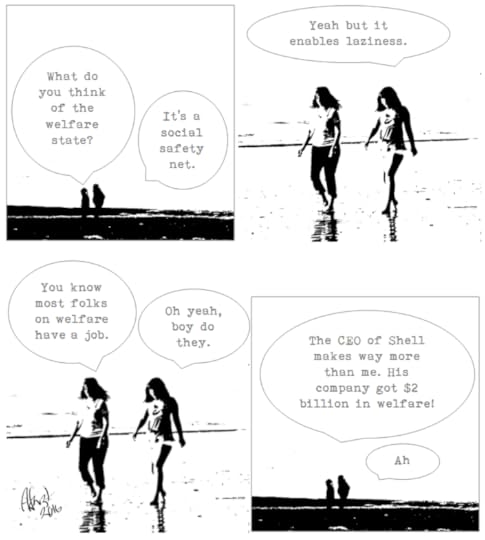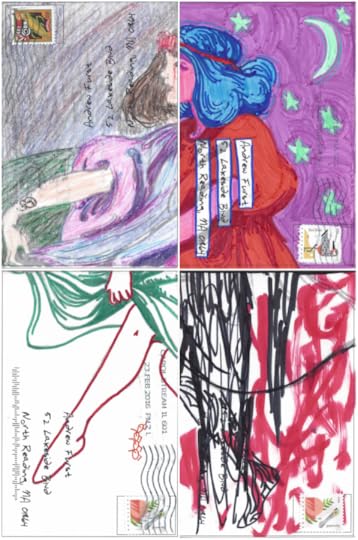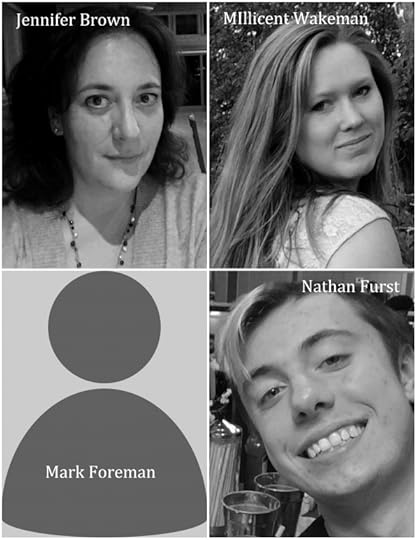Andrew Furst's Blog, page 43
September 27, 2016
Green Pear Tree in September by Freya Manfred – Compass Songs
.
On a hill overlooking the Rock River
my father’s pear tree shimmers,
in perfect peace,
covered with hundreds of ripe pears
with pert tops, plump bottoms,
and long curved leaves.
Until the green-haloed tree
rose up and sang hello,
I had forgotten. . .
He planted it twelve years ago,
when he was seventy-three,
so that in September
he could stroll down
with the sound of the crickets
rising and falling around him,
and stand, naked to the waist,
slightly bent, sucking juice
from a ripe pear.
Compass Songs is an ongoing series of works by poets that I enjoy. Poetry, as the Zen Masters have said, is like a finger pointing to the moon. It speaks the unspeakable.
Get Each Week's Compass Song In Your Email Box
If you enjoyed this post, please like and share.
The post Green Pear Tree in September by Freya Manfred – Compass Songs written by Andrew Furst appeared on Andrew Furst.
September 26, 2016
Where is Truth? – Dialectic Two Step
Estimated reading time: 5 minute(s)
There are various eyes and as a result there are various truths, and as a result there is no truth. – Friedrich Nietzsche
I have trouble with Truth with a capital T. It’s the view that there is an objective correct answer to a question. It is, at best, a human hypothesis. If all the caveats that make it tolerable — i.e. “we can probably never know the truth” are required, then what benefit does it carry in our vocabulary? What does it offer except a burning concern that we may be completely wrong about everything?
Here’s the question I’d ask to get at the bottom of this: If it’s just an unprovable hypothesis then why do humans need to appeal to it?
My answer is that its value is in a worldview that requires it for consistency.
Platonic philosophy and Christian theology (brought together by Aquinas) postulate a worldview in which Truth exists. Since worldviews offer individuals immense benefit, then there appears to be good reason to tolerate the concept.
My opinion (from inside of my world view) is that something that takes the form of an answer to a question cannot be Truth. So I don’t need Truth, and thus I don’t see its benefit.
The best worldview is the most beneficial and requires the least number of unprovable assumptions
Click To Tweet
I would also offer the following argument about worldviews for you to consider when appealing to Truth.
Humans build worldviews
If we must have a world view, then the best world view is one that offers the most benefit.
A beneficial worldview is one that is highly consistent with experience (i.e. something like a theory in that it predicts consequences so we can act accordingly)
The best worldview is the most beneficial and requires the least number of unprovable assumptions (e.g. that there is Truth)
Of course, my feeling is that the right answer is the one that works for you.
Dialectic Two-Step is an ongoing series of my thoughts on questions that come my way.
Wisdom lies neither in fixity nor in change, but in the dialectic between the two. - Octavio
Get Each Week's Dialectic Two Step In Your Email Box
If you enjoyed this post, please like and share.
The post Where is Truth? – Dialectic Two Step written by Andrew Furst appeared on Andrew Furst.
Where is Truth – Dialectic Two Step
Estimated reading time: 5 minute(s)
There are various eyes and as a result there are various truths, and as a result there is no truth. – Friedrich Nietzsche
I have trouble with Truth with a capital T. It’s the view that there is an objective correct answer to a question. It is, at best, a human hypothesis. If all the caveats that make it tolerable — i.e. “we can probably never know the truth” are required, then what benefit does it carry in our vocabulary? What does it offer except a burning concern that we may be completely wrong about everything?
Here’s the question I’d ask to get at the bottom of this: If it’s just an unprovable hypothesis then why do humans need to appeal to it?
My answer is that its value is in a worldview that requires it for consistency.
Platonic philosophy and Christian theology (brought together by Aquinas) postulate a worldview in which Truth exists. Since worldviews offer individuals immense benefit, then there appears to be good reason to tolerate the concept.
My opinion (from inside of my world view) is that something that takes the form of an answer to a question cannot be Truth. So I don’t need Truth, and thus I don’t see its benefit.
The best worldview is the most beneficial and requires the least number of unprovable assumptions
Click To Tweet
I would also offer the following argument about worldviews for you to consider when appealing to Truth.
Humans build worldviews
If we must have a world view, then the best world view is one that offers the most benefit.
A beneficial worldview is one that is highly consistent with experience (i.e. something like a theory in that it predicts consequences so we can act accordingly)
The best worldview is the most beneficial and requires the least number of unprovable assumptions (e.g. that there is Truth)
Of course, my feeling is that the right answer is the one that works for you.
Dialectic Two-Step is an ongoing series of my thoughts on questions that come my way.
Wisdom lies neither in fixity nor in change, but in the dialectic between the two. - Octavio
Get Each Week's Dialectic Two Step In Your Email Box
If you enjoyed this post, please like and share.
The post Where is Truth – Dialectic Two Step written by Andrew Furst appeared on Andrew Furst.
September 25, 2016
September – Quotes
Quotes -The path to right view is an arduous walk through fields of manure.
Get Each Week's Quotes In Your Email Box
If you enjoyed this post, please like and share.
September days are here – Helen Hunt Jackson
The post September – Quotes written by Andrew Furst appeared on Andrew Furst.
September 24, 2016
Welfare State – Say What?

Say What? is an ongoing series of laconic exchanges on Buddhism in the format of a comic strip.
Get Each Week's "Say What?" Comic In Your Email Box
If you enjoyed this post, please like and share.
The post Welfare State – Say What? written by Andrew Furst appeared on Andrew Furst.
September 23, 2016
The Evolution of Buddha – Modern Koans
Question: Why does Buddha focus on Mind?
My Response: As I discussed in a recent post, mind is a product of evolution. To use Daniel Dennett’s language, it’s a good evolutionary trick. When we talk about survival, the measure of fitness applies to the gene. A common misunderstanding of evolutionary theory is that the individual or a species are what pass or fail the fitness test. Not true. Richard Dawkins explained in the 1970’s in his book “the Selfish Gene”, it is the gene.
When we talk about the individual or the self, we’re talking about a byproduct of gene programming. All of our traits – eye color, height, skeletal structure, and so on – are the result of natural selection acting on collections of these chunks of self-replicating DNA. This includes the structure and workings of the brain.
What Is Mind?
The function of the mind is to preserve and enhance the survival of the genes the body carries. Mind is an evolutionary adaptation. It takes the form of a configuration of neurons and functions as a mental workspace. In that space, we’re able to manage an assortment of memories and real time sensory data.
Humans are one of an elite group of species that have the function of mind. Mind allows us to take the standard input and output of the brain and fiddle with it. Similar in design to how a computer retrieves the data it needs to solve a problem and puts it in RAM to access during computation. We can reflect on the past and plan for the future. We can use experience to enhance our performance in the present moment.
Beyond Mind?
Of course memories and sensory information are not reality. They are data filtered through our sensory hardware (eyes, ears, nose, tongue, skin, brain, and so on). There is an immense amount of bias baked into that machinery that gives our genes a survival advantage. That bias often isn’t subject to conscious awareness and control. So it’s always important to remember that the function of mind, first and foremost, is to ensure the replication of genes. Any time we talk about truth or reality, these are orthogonal to the purpose of mind.
This creates an interesting problem for the “self”. At the root of it is a divergence of purpose between genes and the individual. Genes are wired for immortality; the individual is wired for the more modest goal of pleasure. Pleasure is a neurochemical adaptation that conditions us to seek food, shelter, and sexual partners.
Success for the gene is a new generation of life forms that carry copies of itself. Success for the self is satisfaction. A gene, being non-sentient entity, has no sense of its success or failure. The self however, is capable of noticing. In fact many of us discover ourselves on a treadmill of seeking, finding, consuming, and seeking again; constantly looking for satisfaction when the last high fades.
No Place Like Home
The good news is that not only are we able to notice, but we are capable of examining and adjusting to our biases. Mind can adopt strategies to temper the pleasure beast and discover contentment. Mind can also discover and adapt to the understanding of its purpose.
The Buddhist focus on the mind is an acknowledgement of the odd situation we’re in. Our inherent nature is just what it needs to be (we are highly adapted for our environment), but our minds may not be as tuned towards truth as we imagine it to be. As individuals we identify with the jumble of attributes that are available to us in mind. We don’t see things from the gene’s eye or from any other perspective. To put it another way, all we have is mind, all we are is mind.
What else is there but mind for us? Is this just a solipsistic view of the world? Is it idealism?
I'd love to hear your thoughts in the comments below.
Modern Koans is an ongoing series that recognizes that good questions are often more important than their answers.
The riddles of God are more satisfying than the solutions of man. ― G.K. Chesterton
Get Each Week's Modern Koans In Your Email Box
If you enjoyed this post, please like and share.
The post The Evolution of Buddha – Modern Koans written by Andrew Furst appeared on Andrew Furst.
September 22, 2016
Thomas Sowell on Ignorance – Quotes
Quotes -The path to right view is an arduous walk through fields of manure.
Get Each Week's Quotes In Your Email Box
If you enjoyed this post, please like and share.
Thomas Sowell on Ignorance
The post Thomas Sowell on Ignorance – Quotes written by Andrew Furst appeared on Andrew Furst.
We Are What We Eat – One Minute Meditation
They say we are what we eat. We are what we taste, smell, feel, see, and hear. Everything we take in is absorbed by our sponge like brains. It’s the fodder that forms our base of experience. Experience forms the seeds of who we are.
If we are constantly tuned into our computers, TVs, video games, devices and movies we become the frenetically paced children of mindlessness.
Set aside a minute to take in and reconnect to the natural rhythms of nature. Feed yourself the experience that will blossom into a person who is peaceful and contented.
Ripples In The Rain
Freedom with Duty
Each of us touching circles
What we do, they feel
If you enjoyed this post, please like and share.
Minute Meditations is an ongoing series of short videos, poems, and commentary intended as a meditation. Offered as an opportunity to step back from your cyber routine and settle into a more natural rhythm, if only for a minute.
Get Each Week's Minute Meditations In Your Email Box
These videos are produced for those of us who spend an inordinately large amount of time in the cyber-world. They are not a substitute for unplugging from your devices and taking a stroll near trees, water, or a patch of unkempt grass. Getting out into the world - touching, smelling, hearing, and seeing nature is the best way to reconnect with our prime purpose.
What is our prime purpose? We are feeling and sensing machines. We are the universe looking back on itself. We are witness to the wonders and dangers of living in this corner of the cosmos. We are the seekers looking for connection a little further beyond yesterday's borders and boundaries.
But sitting and staring at the screen robs us of the sustenance that we rely upon for wonder and sanity. These videos are an opportunity to bring the sensations of nature to you, while you're in the cyber-world. Its an opportunity to relax your gaze, resettle your posture, and regain some depth in your breath. Listen and watch the video and allow your self to open up and recharge.
The post We Are What We Eat – One Minute Meditation written by Andrew Furst appeared on Andrew Furst.
September 21, 2016
Post Card Art Project – Stepping Out of the Dark Night
The artist (and let me know if there are mistakes) are shown below in the same position as their card:



The Post Card Art Series
This is one of a series of Post Card Art Projects. These are collaborative arts project done on postcards with people all over the world.
Using an image divided into sections, I created postcards for each section. I printed, pre-stamp, and mailed them out to patreon supporters, friends, and blog readers who expressed an interest. The artists add their art, mail the cards back, and I assemble them.
The results are fun and unique.
The post Post Card Art Project – Stepping Out of the Dark Night written by Andrew Furst appeared on Andrew Furst.
September 20, 2016
To the Light of September by W. S. Merwin – Compass Songs
.
When you are already here
you appear to be only
a name that tells of you
whether you are present or not
and for now it seems as though
you are still summer
still the high familiar
endless summer
yet with a glint
of bronze in the chill mornings
and the late yellow petals
of the mullein fluttering
on the stalks that lean
over their broken
shadows across the cracked ground
but they all know
that you have come
the seed heads of the sage
the whispering birds
with nowhere to hide you
to keep you for later
you
who fly with them
you who are neither
before nor after
you who arrive
with blue plums
that have fallen through the night
perfect in the dew
Compass Songs is an ongoing series of works by poets that I enjoy. Poetry, as the Zen Masters have said, is like a finger pointing to the moon. It speaks the unspeakable.
Get Each Week's Compass Song In Your Email Box
If you enjoyed this post, please like and share.
The post To the Light of September by W. S. Merwin – Compass Songs written by Andrew Furst appeared on Andrew Furst.




